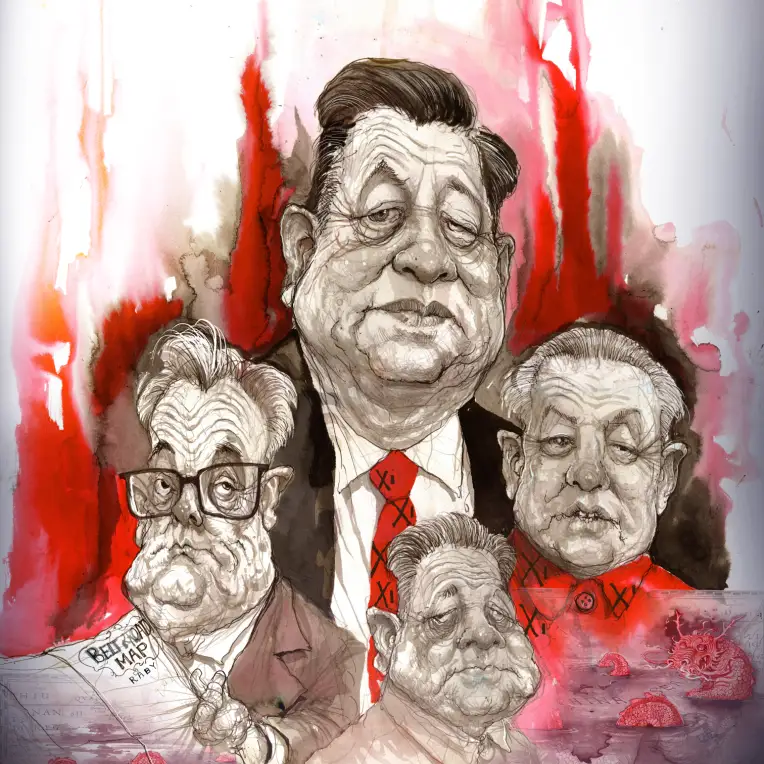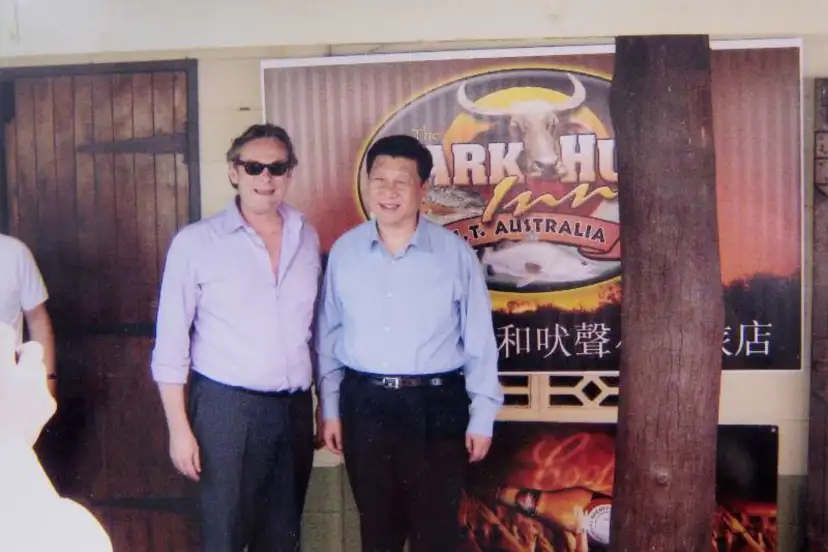Last Updated:2022-11-10

Former diplomat Geoff Raby (left) says Xi Jinping has swept aside the collective leadership introduced by Deng
Deng did not, however, change the Leninist nature of the CommunistParty with its highly concentrated power at the top. Rather he grafted on a set of loose conventions. Xi swept these aside five years ago when termlimits on the president were abolished. The Deng period of limited political reforms was thus an aberration.
Understandably, Xi attracts a lot of interest as analysts seek tounderstand his motives. Some have rediscovered that Xi heads a Leninistparty. No surprises there. It has been for over a hundred years.
Others look to Xi’s interest in Marxism. Marxist concepts do pepper hisspeeches more than his predecessors’. But Marxism has always provided the intellectual framework for the CCP’s rule, together with lashings of nationalism.
Imagining Xi mumbling about dialectical materialism over his morning bowl of congee doesn’t much help to explain his epochal vision of the great rejuvenation of the Chinese people, of China taking its rightful place of leadership of a community of nations, of the Belt and Road Initiative, or as the architect of a Chinese-bounded order.
These visionary ambitions speak of his sense of destiny. The key to understanding that lies not in some outdated European philosophical tome, but in something more prosaic, something more deeply rooted in traditional Chinese culture. First and foremost, Xi is a Chinese man.
Accordingly, he is imbued with traditional values, of which filial piety is among the weightiest.

Geoff Raby and Xi Jinping at a roadhouse in Kakadu, June 2010. none
My term as Australia’s ambassador to China, coincided almost exactly to Xi’s term as vice president. By dint of good luck this meant I spent quite some time with Xi, most memorable of which was during his long visit to Australia in June 2010, the same week Kevin Rudd was deposed as prime minister.
Special privileges
However, my first meeting with Xi was in May 2007 when he had just been appointed party secretary of Shanghai. By the early 2000s, it had become increasingly difficult for an Australian ambassador to have requests granted for calls on party secretaries of major provinces or cites. The US or Japanese ambassadors would see them, but such officials were becoming too important for an Australian ambassador.
At first, our request was politely declined, as we had anticipated, by Shanghai’s foreign affairs office, ostensibly because having recently taken up his duties, Xi was too busy. So, we were surprised when at short notice, we were told he would see us. It remains a mystery as to why our request to have a meeting with Xi, having first been knocked back by middle-level officials, was granted.
It was, however, made clear that this call was a special privilege. We were allotted only 20 minutes. On entering the meeting room, Xi was all smiles and, exceptionally, was accompanied by both the mayor and vice mayor of Shanghai. Several weeks earlier when then foreign minister Alexander Downer had visited Shanghai, he saw only the vice mayor as the party secretary had not yet been installed and the Mayor was “out of town”. I was already wondering how to report my much-elevated level of reception to Canberra.
Xi expressed his fondness for Australia, recounting his visit as party secretary of Zhejiang province to Western Australia to discuss LNG. He was impressed by Australia’s resources and saw unlimited potential for close cooperation between China and Australia. He was proud that as governor of Fujian province, he had promoted and oversaw the establishment of a sister province-state relationship with Tasmania. He looked forward to visiting Tasmania. He was expansive and friendly and wished to keep in contact. He again mentioned his interest in importing Australian LNG. Our meeting went for over an hour.
A trip to Yan’an
Discussing this with my friend from Xi’s family, I was told the entire extended family was overjoyed and in tears at the news, which was regarded also by the family as a surprise. I was astonished then to learn that many people regarded Xi’s elevation as the return of the “natural order” of Chinese Communist Party leadership. It was explained to me that, among elite families, some held the view that Xi Jinping’s father, Xi Zhongxun, should have led China post 1949. The
reasoning was that Xi the elder had rescued the Long March when the remnants turned up in Shaanxi province. Only some 8000 out of some 100,000 Red Army soldiers survived the year-long retreat from Chiang Kai-Shek’s nationalist forces. Xi’s father was then the commander of the Shaanxi military district for the
communist party. He had installed them in the caves in Yan’an, where they remained, intriguing against – and occasionally murdering – each other, until Japan had been defeated and it was time to attack the nationalists, and Mao prevailed as party leader.
Whether this was family folklore or not, young Xi Jinping probably absorbed many of the stories from his family that had his father in the centre of things in Yan’an, and someone wronged by Mao, well before vice premier Xi Zhongxun was purged in 1962 and then imprisoned during the Cultural Revolution. Xi Jinping would come to see his duty as being to right the wrongs against his father and family, and carry further in his father’s name the true destiny of the Party.
By chance, I had visited Yan’an only a few weeks before Xi’s visit to Australia. There I toured the caves where the Party leadership had stayed and in one saw a photograph of Xi’s father. In view of Xi’s elevation to the top of the Party, I took particular note of this.
Alone with Xi
On Tuesday, June 22, 2010, a large state reception was held at lunchtime in Parliament House in Canberra, hosted by the prime minister. After the speeches, Kevin Rudd excused himself saying that as it was a sitting week and he needed to prepare for question time. He told me foreign minister Stephen Smith and trade minister Simon Crean would stay with Xi. As soon as Rudd left, Smith and Crean also disappeared. Presumably, they were all doing the numbers on the
leadership spill, although we did not know it at the time. Two days later, Rudd was dumped by his colleagues and replaced by Julia Gillard.
Suddenly Xi and I were alone at the big table. Through several meetings with him and travelling together we were relaxed with each other. I went to keep him company and he stood to chat with me. In my bad pidgin
Chinese, I mentioned that I had recently been in Yan’an and had seen thephotograph of his father.
Xi became animated, his face brightened, and he began to say that was indeed his father’s picture I had seen. At that point, a phalanx of Chinese officials led by ambassador Zhang Junsai virtually rugby tackled me away, panicked that they had left their charge alone to be accosted by the Australian ambassador to China.
Last of the clan
The next day, I accompanied Xi on a visit to Kakadu National Park to view Aboriginal cave paintings. Xi had personally requested this to be included in his six-day Australian program, as he had developed a particular interest in the subject.
Xi chose to travel on the bus arranged for his staff rather than a limousine. I sat across the aisle from him. We chatted frequently through an interpreter. At the site, Xi enthusiastically examined the paintings but the area was too small to include anyone other than his Aboriginal guide and interpreter.
On the return trip, Xi told me that the guide had said he was the last person left from his clan. Xi was clearly troubled by this and returned to the topic several times, asking me what would the man do, who would he marry, how was it possible that he was the last of his clan?
It felt that Xi, who would soon take on governing over a billion Han Chinese, was perplexed by the idea of having met the last man of a clan, or for him, race. Perhaps this chance meeting also had an impact on Xi, on his sense of destiny and on the profound responsibilities he may have felt as he prepared to lead China.
Five days after the 20th Party Congress, Xi surprised many by taking the entire standing committee to visit Yan’an. This was unprecedented. Many said Xi was following Mao. The meaning of the visit, however, would have been clear to standing committee members as they toured the caves. Most likely they would have stopped together to look at the photograph of Xi’s father, the one I had seen all those years ago. Xi had finally and unambiguously restored the correct lineage for the leadership of the Party, and most importantly he had fulfilled his duty to his father. This was not about venerating Mao, the villain, but rather Xi Zhongxun, the hero. This was a crucial moment in cementing the legitimacy of Xi’s rule.
Xiaoping (centre front) and is righting the wrongs against his father, Xi Zhongxun (right). David Rowenone
On returning to Beijing, I received some positive feedback from an unexpected source. I had been friendly with a member of Xi’s family. The family connection was not by blood but marriage. I had not told this person, who lived in Beijing, that I had called on Xi in Shanghai. Although there had been some local reporting of the meeting, I was told my visit had been mentioned during a conversation among family members.
In October that year, Xi bested his rival Li Keqiang to become vice president. For many this was a surprise, as Xi had so recently been appointed Shanghai party boss.





